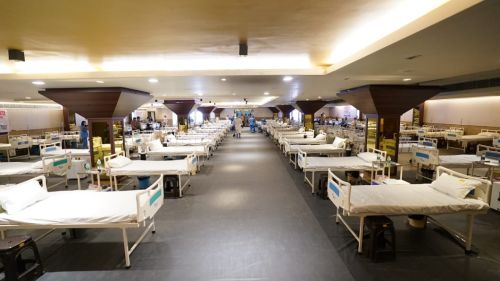Delhi faces severe shortage of healthcare staff
June 25, 2020 16:31

As the number of beds in private hospitals for COVID-19 patients is being increased, there are complains of acute shortage of manpower -- doctors, nurses and other paramedical staff to treat coronavirus patients, putting further stress on the city's health infrastructure.
Private hospitals say the shortage is due to lack of experts to treat coronavirus-related complications and because a large number of healthcare staff has to undergo quarantine. Many medical professionals have quit the jobs due to fear of infection or family pressure, while others have demanded more money and insurance.
Demoralised staff, lack of government support, infection among healthcare workers, reluctance of families to allow their loved ones to work in COVID wards, patients preferring private facilities over government hospitals are also some reasons why private hospitals in the national capital are facing a shortage of staff.
Amid a surge in coronavirus cases and the government's impetus on increasing beds by turning banquet halls and hotels into COVID facilities and attaching them with hospitals, the managements of these hospitals are faced with their own internal crisis.
At the Delhi Heart and Lung Institute, a quarter of nurses had quit even before the hospital was converted into a COVID facility while another 15 percent nurses quit after it was turned into a coronavirus facility, citing reasons like parental pressure and personal fears and anxieties, according to hospital officials.
Similarly, at Saroj Super Speciality Hospital in Rohini, 40 to 50 per cent nurses stopped reporting to work citing reasons such as lack of transportation and refusal of families to let them be on COVID duty, said an official.
"There is a shortage of doctors. Our hospital has a cardiac unit and our doctors are trained to handle those cases. But with a disease that is hitherto unknown, you need many kinds of specialists, like internal medicine, respiratory medicine specialists, etc. They are not available, said Dr KK Sethi, chairman, DHLI.
The resident doctors who handle emergency units are refusing to work. Nobody wants to join the hospital if you tell them they will have to work in COVID wards. Those who are willing to work are asking for exorbitant salaries, almost three to four times of what they would usually get, he said. The Delhi government is increasing bed capacity in the national capital to tackle coronavirus cases, which are expected to touch 5.5 lakh by the end of next month, but experts feel it's being done without keeping in mind the human factor. Dr RK Mani, Medical Director & Chairman, Critical Care & Pulmonology, Batra Hospital, said it is important to maintain an optimal doctor-patient and nurse-patient ratio.
"Increase in bed without appropriate increase in staff is not ideal. There is a greater chance of infection to healthcare workers and among patients. There are the issues of loss of morale, exhaustion and burnout. They may get aggravated to the point that people may choose to leave their jobs," he said.
Explaining the optimal ratio, he said in ICUs there should be one nurse for not more than three patients and outside the ICU, the ratio should be one nurse for not more than six to eight patients. Similarly, a doctor cannot see more than eight patients in the ICU. -- PTI
Image: A banquet hall where a 100 bed COVID-19 care facility has been established in New Delhi. Pic: ANI





 © 2024 Rediff.com -
© 2024 Rediff.com -